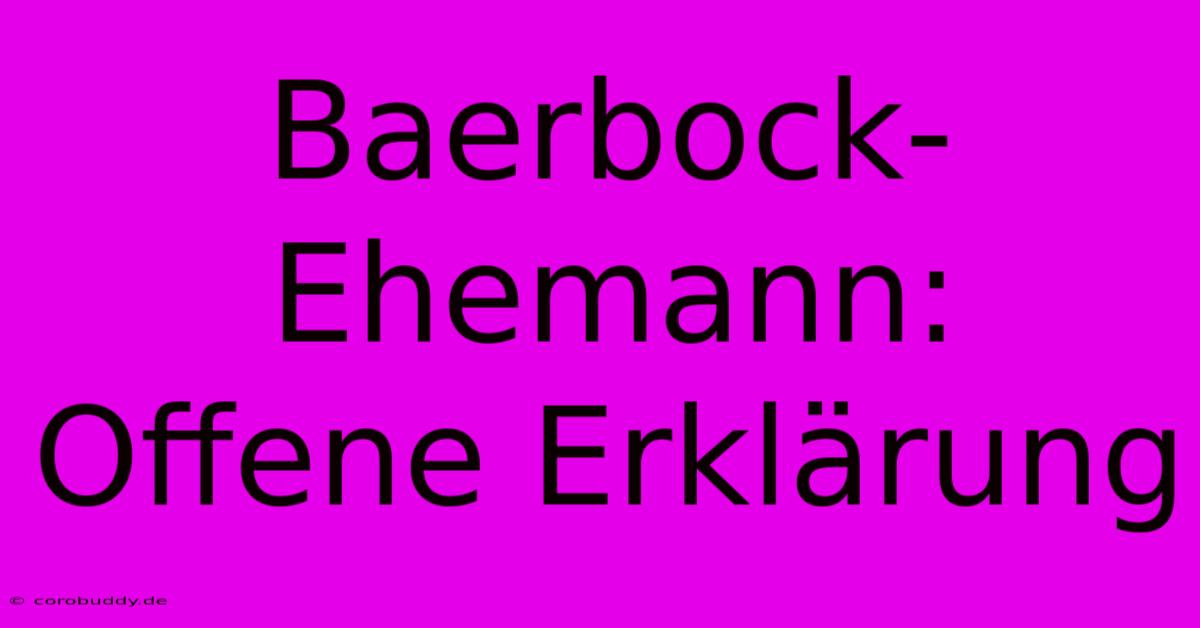Baerbock-Ehemann: Offene Erklärung

Discover more detailed and exciting information on our website. Click the link below to start your adventure: Visit Best Website Baerbock-Ehemann: Offene Erklärung. Don't miss out!
Table of Contents
Baerbock-Ehemann: Offene Erklärung – Ein Blick hinter die Kulissen
Hey Leute! Let's talk about something that's been buzzing around – Annalena Baerbock's husband, and the whole "offene Erklärung" thing. It's a bit of a messy situation, isn't it? Honestly, I've been following this closely, and it's got me thinking a lot about transparency in politics and how the media portrays personal lives.
First off, for those who aren't totally in the loop, the fuss is about the lack of complete transparency regarding Daniel Baerbock's professional activities and any potential conflicts of interest with his wife's political career. There's been a lot of speculation and frankly, some pretty wild accusations. You know how it is; the internet can be a crazy place.
<h3>My Take: Navigating the Murky Waters of Public Scrutiny</h3>
I remember when a similar thing happened with a local politician a few years back. It was a total mess. The accusations weren't as serious as in Baerbock's case, but the fallout was still huge. The media frenzy was intense – 24/7 news cycles, endless speculation, and social media going absolutely bonkers. It was exhausting to even follow.
It really highlighted the tough tightrope walk politicians and their families have to navigate. Maintaining privacy while also being transparent enough to avoid fueling rumours is like trying to walk a tightrope blindfolded. It's incredibly difficult.
This whole "offene Erklärung" – an open explanation – is exactly what's needed here. But it needs to be comprehensive. Vague statements just won't cut it. People are rightfully demanding clarity and concrete details. No more smoke and mirrors. Transparency builds trust, and right now, that trust is kinda shaky.
<h3>The Importance of Transparency in Politics</h3>
The truth is, we all want our leaders to be honest and upfront. We want to know that their decisions aren't influenced by personal gain or hidden agendas. That's why this situation is so important. It's not just about Baerbock and her husband; it's about the principles of good governance and accountability.
Think about it – if we can't trust our politicians to be open about their personal affairs, how can we trust them with anything else? It's a slippery slope. This situation emphasizes the importance of robust ethics regulations and stronger mechanisms for holding public officials accountable. We need better systems in place to prevent conflicts of interest and ensure complete transparency.
<h3>Lessons Learned: The Power of Proactive Communication</h3>
One thing I've learned from following numerous political scandals – and believe me, I've seen quite a few – is that proactive communication is key. Addressing concerns head-on, even if it's uncomfortable, is better than letting speculation fester. A swift, clear, and comprehensive response can often mitigate the damage.
Delaying a response, or worse, stonewalling, only exacerbates the problem. It creates space for rumour and misinformation to spread like wildfire. It also makes the whole situation seem far more suspicious than it might have initially been. This Baerbock situation really underscores this point.
This whole thing is a reminder that in the digital age, with its constant stream of information and instantaneous news cycles, transparency isn't just a good idea – it's a necessity. For politicians, especially.
So, yeah, the Baerbock-Ehemann situation is complex. It highlights the challenges of balancing public life and private life, the pressure of constant media scrutiny, and the importance of complete transparency in politics. It's a situation that needs a clear, open explanation. And we're waiting to see if and how that will happen. What are your thoughts? Let me know in the comments!

Thank you for visiting our website wich cover about Baerbock-Ehemann: Offene Erklärung. We hope the information provided has been useful to you. Feel free to contact us if you have any questions or need further assistance. See you next time and dont miss to bookmark.
Featured Posts
-
Schmidt Ueber Karriereende Heidenheim
Nov 23, 2024
-
Nach Der Juli Revolution Bangladesch Heute
Nov 23, 2024
-
Stuttgart Bochum Live Bundesliga Im Tv And Ticker
Nov 23, 2024
-
Scattered Spider Hacker Vor Gericht
Nov 23, 2024
-
Koeln Aufstiegskampf 2 Liga
Nov 23, 2024
